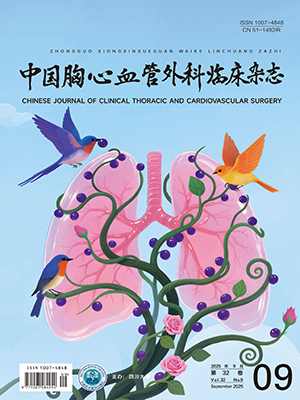| 1. |
Jemal A, Center MM, DeSantis C, et al. Global patterns of cancer incidence and mortality rates and trends. Cancer Epidemiol Biomarkers Prev, 2010, 19(8): 1893-1907.
|
| 2. |
Howington JA, Blum MG, Chang AC, et al. Treatment of stage Ⅰ and Ⅱ non-small cell lung cancer: Diagnosis and management of lung cancer, 3rd ed: American College of Chest Physicians evidence-based clinical practice guidelines. Chest, 2013, 143(5 Suppl): e278S-e313S.
|
| 3. |
Solaini L, Prusciano F, Bagioni P, et al. Video-assisted thoracic surgery (VATS) of the lung: analysis of intraoperative and postoperative complications over 15 years and review of the literature. Surg Endosc, 2008, 22(2): 298-310.
|
| 4. |
李剑锋, 杨帆, 李运, 等. 连续 100 例全胸腔镜下肺叶切除术的临床分析. 中国胸心血管外科临床杂志, 2009, 16(1): 1-5.
|
| 5. |
曾剑, 刘金石. 胸腔镜辅助肺癌切除术后生活质量的研究. 中国肺癌杂志, 2014, 17(3): 209-214.
|
| 6. |
王俊, 李剑锋, 张利华, 等. 胸腔镜辅以胸壁小切口的全肺切除术. 中华胸心血管外科杂志, 1998, 14(4): 8-9.
|
| 7. |
傅成国, 姜杰, 高惠川, 等. 胸腔镜辅助小切口解剖肺叶及全肺切除术的临床研究. 中国微创外科杂志, 2008, 8(3): 241-242.
|
| 8. |
Misthos P, Katsaragakis S, Theodorou D, et al. The degree of oxidative stress is associated with major adverse effects after lung resection: a prospective study. Eur J Cardiothorac Surg, 2006, 29(4): 591-595.
|
| 9. |
Battoo A, Jahan A, Yang Z, et al. Thoracoscopic pneumonectomy: an 11-year experience. Chest, 2014, 146(5): 1300-1309.
|
| 10. |
Nagai S, Imanishi N, Matsuoka T, et al. Video-assisted thoracoscopic pneumonectomy: retrospective outcome analysis of 47 consecutive patients. Ann Thorac Surg, 2014, 97(6): 1908-1913.
|
| 11. |
Nwogu CE, Yendamuri S, Demmy TL. Does thoracoscopic pneumonectomy for lung cancer affect survival? Ann Thorac Surg, 2010, 89(6): S2102-S2106.
|
| 12. |
李运, 杨帆, 刘彦国, 等. 全胸腔镜肺叶切除术中转开胸手术指征的探讨. 中国胸心血管外科临床杂志, 2010, 17(1): 32-35.
|
| 13. |
汪志海, 孙晓雁, 郭明. 全肺切除术后并发症的防治进展. 中国胸心血管外科临床杂志, 2015, 22(4): 380-384.
|
| 14. |
张昱, 姜芸, 刘亚华. 肺癌全肺切除术的围术期处理. 中国实用医药, 2011, 6(31): 34-35.
|
| 15. |
吴怀申, 周允中, 张新民, 等. 肺癌术后并发的心律失常(附 140 例全肺切除术资料分析). 中华肿瘤杂志, 1994, 16(6): 435-437.
|
| 16. |
常涛, 张铸. 肺癌患者术后院内肺部感染的相关因素分析. 中国胸心血管外科临床杂志, 2013, 20(2): 176-180.
|
| 17. |
张皓, 齐海, 王磊, 等. 电视胸腔镜与开胸手术治疗非小细胞肺癌随机对照研究的系统评价和 Meta 分析. 中国胸心血管外科临床杂志, 2015, 22(12): 1087-1094.
|
| 18. |
Cai Y, Fu X, Xu Q, et al. Thoracoscopic lobectomy versus open lobectomy in stage i non-small cell lung cancer: a meta-analysis. PLoS One, 2013, 8(12): e82366.
|
| 19. |
Higuchi M, Yaginuma H, Yonechi A, et al. Long-term outcomes after video-assisted thoracic surgery (VATS) lobectomy versus lobectomy via open thoracotomy for clinical stage IA non-small cell lung cancer. J Cardiothorac Surg, 2014, 9: 88.
|
| 20. |
Algar FJ, Alvarez A, Aranda JL, et al. Prediction of early bronchopleural fistula after pneumonectomy: a multivariate analysis. Ann Thorac Surg, 2001, 72(5): 1662-1667.
|
| 21. |
Wright CD, Wain JC, Mathisen DJ, et al. Postpneumonectomy bronchopleural fistula after sutured bronchial closure: incidence, risk factors, and management. J Thorac Cardiovasc Surg, 1996, 112(5): 1367-1371.
|
| 22. |
白连启. 388 例肺结核外科切除病例分析. 中国防痨杂志, 2009, 31(8): 484-487.
|




